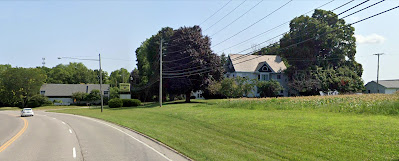Since it’s autumn, thoughts of apples and cider naturally come to mind, and a variety of local orchards and farms are ready to satisfy everyone’s particular taste.
Although Spiegelberg Orchards is no longer in business (its former site is presently undergoing the transformation for its new use as the home of a Carvana facility), it's pleasant to remember shopping there as it was one of the closest orchards to Lorain.
Read all about Ken Spiegelberg and his family business in the fine profile below, written by Journal Staff Writer Hugh Gallagher that appeared in the paper on October 18, 1970 – fifty years ago.
****
It’s Apple Cider Time
Spiegelberg Orchards: Business as Brisk as the Air
By HIGH GALLAGHER, Staff Writer
APPLE CIDER is as sure a sign of autumn as the falling leaves. Ken Spiegelberg is pretty busy at this time of year, as was his father before him, for his business is an orchard and a roadside fruit and vegetable stand.
FOR FIFTY years, Spiegelberg Orchards, 6161 Middle Ridge Road, just south of Lorain, has been providing quality apple cider and many other products to the people of the area.
Spiegelberg pulled up an apple crate in the open air market on a recent brisk autumn day and talked of the changes that have occurred over the years and those he expects to see in the future.
In 1920 Earl W. Spiegelberg opened the produce market which carries apples, peaches, pears, prunes, potatoes and a number of other produce goods. The market developed out of a farm owned by Earl’s father William H. Spiegelberg which he settled in 1899.
Earl began with five acres of planting. Today Ken Spiegelberg manages 125 acres of fruit production.
THE OLD MARKET is no longer the same, even the crate that Spiegelberg sits on will soon be a thing of the past. It will be replaced by a corrugated cardboard carton.
But still around is the old fashioned feel of autumn. Bags of large fresh red apples, jars of apple butter and jugs of cider fill the shelves. In the back fresh cider is being made. People from all around the Lorain area come on the brisk October afternoon to buy what Spiegelberg calls nature’s greatest asset to health, apples.
The last fifty years have provided a number of changes both in production methods and customer taste.
“When my father started out apples were primarily packed in bushel baskets and sold. People used to store the apples in their cellars,” Spiegelberg said. “Today our largest seller is the peck bag because people buy smaller quantities at a time.”
People are buying a different kind of apple today too, Spiegelberg said. Years ago they bought most cooking apples to make pies, but today it’s mostly eating apples like the Delicious variety.
Improvements in farming techniques have meant improvement in the quality of the produce, said Spiegelberg.
“We try to insure top quality. To make a quality product it begins in the orchard. You must have a good pruning program to produce a top quality fruit crop. You must have a good fertilizer so trees have good nutrition. That way you don’t have soft apples. And you must have a good spray program to keep out insects and diseases,” Spiegelberg said.
HE SAID THE orchard uses only pesticides under Federal Food and Drug Administration jurisdiction. The orchard also uses a new piece of washing equipment to thoroughly wash the fruits before they are stored.
“We pick the fruit at optimum maturity and put it in our cold storage facility which has a capacity for close to 30,000 bushels,” Spiegelberg said. “We get the fruit in cold storage within 24 hours to insure top quality produce through the winter months.”
The continuously expanding storage space allows for winter consumption of fresh fruits and apple cider that was once impossible.
Spiegelberg said that business at the orchard is always increasing. He said they sell thirty to forty thousand bushels of apples a year and tens of thousands of gallons of apple cider.
For the future Spiegelberg sees many changes, but he is optimistic that the changes of the next fifty years will be as beneficial as the changes of the last fifty years.
“I feel there will be a trend toward the small dwarf trees. These trees are about half the size of the old apple tree. They allow for easier handling and the apples come into production sooner,” Spiegelberg said.
“There will be better methods of pest control by the systemic method. The pesticide will be injected into the tree. As more is being discovered and as the public becomes more aware of the nutritional value of apples, the demand for them will be even greater.”
****
These views (courtesy of Google Maps) of the former Spiegelberg property area are already obsolete, as the farmhouse and all of the buildings in the rear (the market building, barn, etc.) are all gone and the land cleared.








I bet 50 years ago that Ken never imagined that his orchard would be no more in 2020!...His kin folk done sold out his legacy and became instant millionaires overnight....Easy money they say....But the sweat and tears of Ken and his wife beg to differ.....And in an instant 100 years of history is flushed down the toilet.
ReplyDeleteI thought I heard that the orchard was just being moved.
ReplyDeleteTo be fair to the family (which is still farming), this article from Cleveland.com explains the tough decision to sell.
ReplyDeletehttps://www.cleveland.com/metro/2016/12/spiegelberg_orchards_125_acres.html
I believe route 2 had just grabbed a portion of their land when this article was written. Interesting Ken made no mention of it.
ReplyDelete